Coming home to change health care
By Alex Branch
Jeff Beeson, DO, grew up with UNT Health Science Center.
As a kid, he watched Fourth of July fireworks with his father Don, the school’s long-time police chief, from a rooftop when it was just a medical school.
He set up street cones to mark the route of the Cowtown Marathon, founded by UNTHSC in 1979.
Schedule an appointmentSee one of our UNT Health providers by calling 817-735-DOCS. |
As an adult he earned his degree from the Texas College of Osteopathic Medicine.
During that time, Dr. Beeson watched the campus grow from a fledging medical school to a thriving six-school Health Science Center that drives medical education and research in Fort Worth with a mindset of innovation.
Today, Dr. Beeson is leading change on the campus he considers home. As Chief Medical Officer, he is guiding the transformation of UNTHSC patient care delivery to an interprofessional, patient-centered model with better outcomes.
“In our country, health care delivery has been a model that is most convenient for the provider,” Dr. Beeson said. “It is not what is necessarily most beneficial to patients. We are creating a medical team that focuses on addressing the specific health needs of every patient.”
It’s an innovative change, but Dr. Beeson is accustomed to change. He has worked as an emergency medical technician, a paramedic, a registered nurse, a flight nurse, an emergency room physician and member of a FEMA Urban Search and Rescue Team.
He oversaw innovative projects as Medical Director at MedStar Mobile Healthcare and directed a medical command center for a Dallas health care company that provided cutting-edge mobile care.
“Everything I have done was as part of a team — on ambulances, in emergency rooms or on search and rescue,” Dr. Beeson said. “We have a great team to meet our goal at the Health Science Center.”
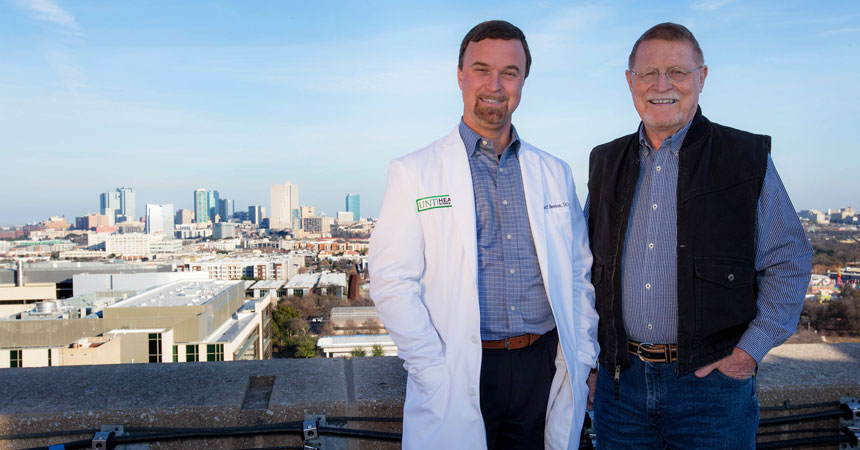
Innovative learning labs
UNTHSC is known as a premier postgraduate medical education institution in North Texas. Perhaps less recognized is the high-quality clinical care it has long provided.
UNT Health, the university’s clinical arm, operates clinics serving family medicine, pediatrics, osteopathic manipulative medicine, cardiology, dermatology, gastroenterology, allergy, geriatrics and vascular surgery. The clinics have about 120,000 patient interactions a year.
The primary clinic is the Health Pavilion, a six-story facility on campus. UNT Health also operates a clinic in south Fort Worth that provides care in an underserved neighborhood.
What sets UNT Health apart from other medical practices is that it leverages the strengths of a health science center and collaborations with UNTHSC schools, colleges and institutes to transform lives, said Provost Charles Taylor, PharmD. Its health care providers also are faculty, who balance time between teaching, research, and improving health and promoting wellness.
Providing patient care on the campus of a medical education institution has advantages. For example, UNT Health providers have access to SaferCare Texas, an institute focused on reducing medical errors and preventable harm to patients, and the Office of Interprofessional Education and Practice, which prepares students from different disciplines to provide quality care to individuals and families as a team.
Providers practicing in the Health Pavilion share space with the Institute of Translational Research, where UNTHSC researchers focus on translating basic science into new treatments and diagnostics for patients faster than ever before.
UNTHSC clinics are innovative learning laboratories for talented students, who perfect their craft alongside faculty health practitioners who are teachers and mentors.
“We have all the resources we need to provide innovative, forward-thinking health care that’s high quality, affordable and that offers an excellent patient experience,” Dr. Taylor said. “Now is our opportunity to look under the hood, so to speak, and make sure we tie it all together.”
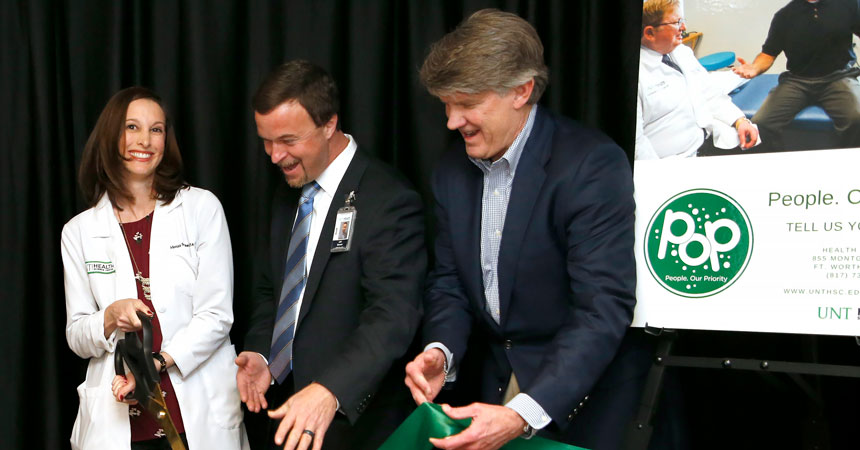
Patients’ best interests
Patient-centered health care sounds great. But what does it really mean?
Imagine you have diabetes, Dr. Beeson said. It’s a disease with a lot of secondary effects, impacting your kidneys, heart, eyes and more.
In a traditional provider-centered delivery model, you go see your family-medicine physician. He or she may prescribe medication but also refer you to a specialist, such as a cardiologist, optometrist or dietician. Sometimes your doctor wants you to see several specialists.
“Soon you are being sent to all these different places for different doctors,” Dr. Beeson said. “It’s neither convenient nor in your best health interests.”
However, in a patient-centered delivery model, you come see your family physician at the UNTHSC Health Pavilion. Your physician wants you to see a specialist, but all the specialists — physician assistants, physical therapists, pharmacists and more — are right there working alongside your doctor.
“Instead of sending you to all these people, we are sending people to you,” Dr. Beeson said. “If the physician needs input from a pharmacist, a pharmacist is right down the hall who could say, ‘You know, there may be a better medication for this patient.’
“Now that’s a health-care delivery model that is truly in the best interests of the patient.”
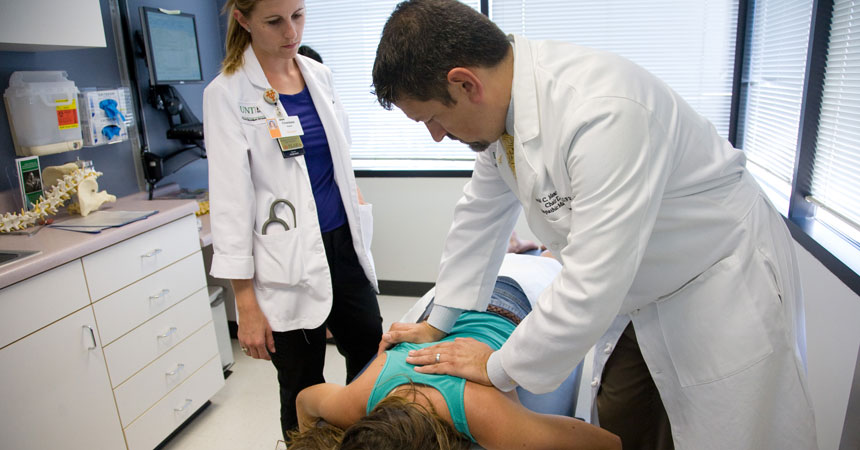
‘I look forward to it’
Patients and their families benefiting from patient-centered care at UNT Health agree.
Carole Young brought her mother, Barbara Brown, to the Health Pavilion in January to meet with a team of UNTHSC geriatric experts — Physician Sarah Ross, DO, Neuropsychologist April Wiechmann, PhD, Medical Social Worker Natasha Bahr, LMSW, and Pharmacist Shara Elrod, PharmD.
They sat together at a table as part of the unique UNTHSC Geriatric Assessment and Planning Program (GAAP) intended to improve the physical and mental function of older patients.
Brown is in the early stages of Alzheimer’s disease. For 45 minutes, the group discussed results from a neurocognitive exam, her prescriptions and community organizations that could help the family.
“It’s not something you experience very often in health care,” Young said. “Everyone sits down together, completely focused on helping Mom and all her specific needs. I look forward to it every time.”
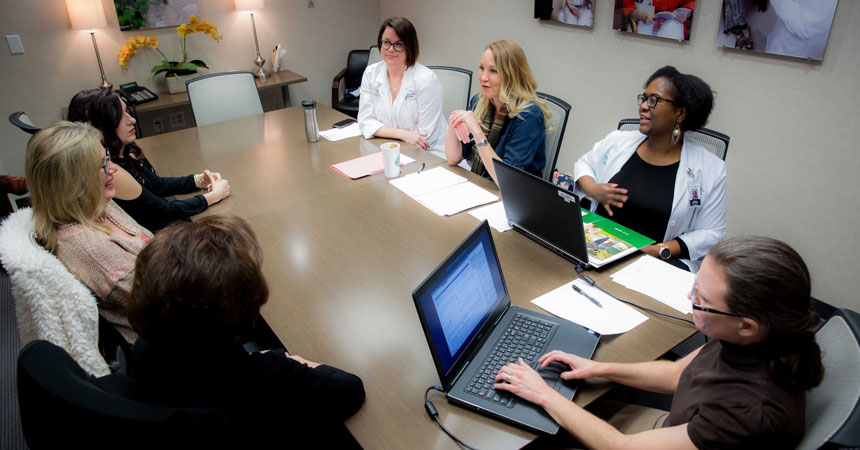
Transformation continues
On his way into work each morning, Dr. Beeson sees change that already has made the Health Pavilion a better patient experience.
The patient waiting rooms were renovated. The first-floor lobby now includes flat-screen TVs. A new call center was created to handle patients’ needs, and private rooms for health coaching were added.
A new Priority Care Clinic on the third floor provides same-day urgent care for UNTHSC team members and their families, and helps arrange follow-up care.
UNTHSC also has partnered with Catalyst Health Network, an independent accountable care organization, to help manage patient populations and improve outcomes.
It’s a far different environment than when Dr. Beeson watched fireworks from the roof.
“It’s an exciting time,” he said. “We have the potential to become a model for the way health care should be delivered in Fort Worth.”
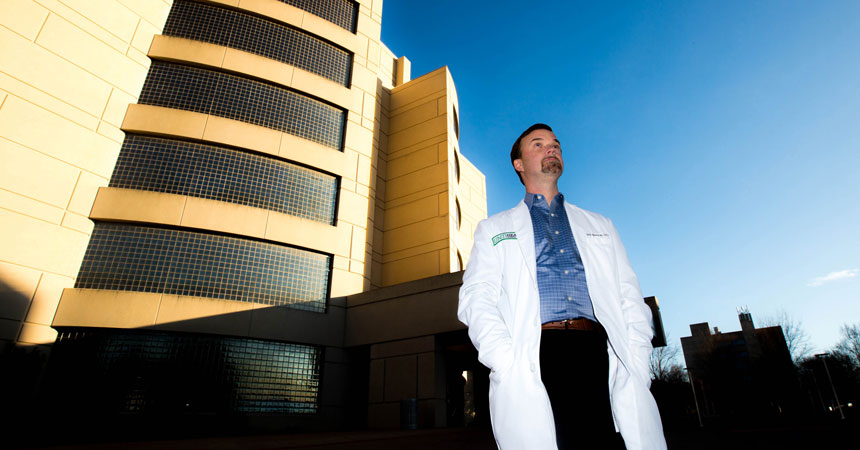





Social media